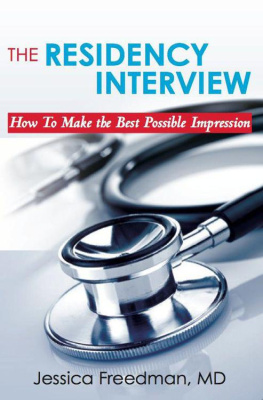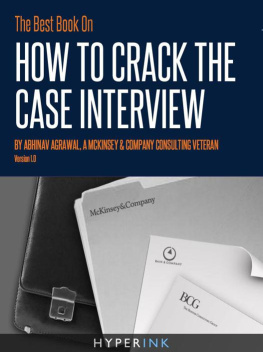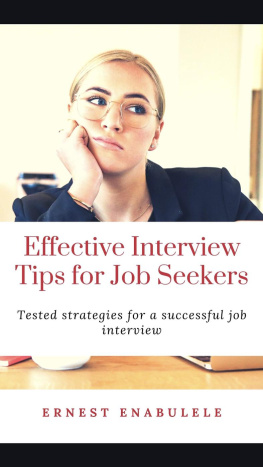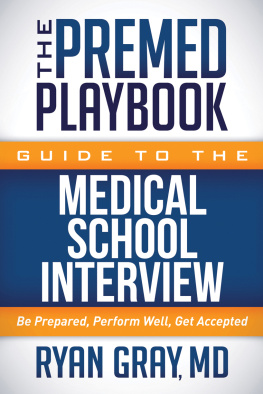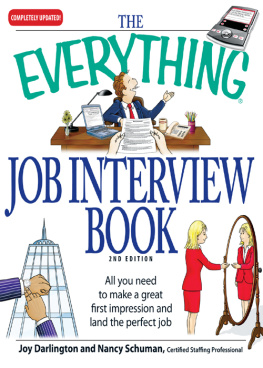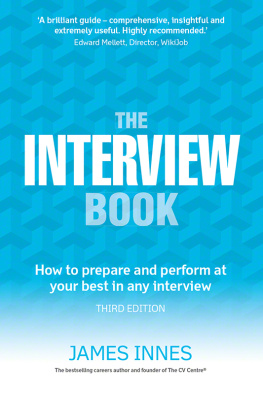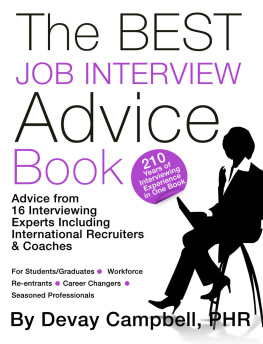

Copyright 2010 Jessica Freedman, MD
MedEdits Publishing
www.MedEdits.com
All rights reserved.
ISBN: 0615325920
ISBN-13: 9780615325927
E-Book ISBN: 978-0-9831291-0-3
Library of Congress Control Number: 2010922471
AUTHORS NOTE:
Some of the anecdotes I have used in this book are based on my actual experiences but applicants identities have been concealed. Some of this material, including the sample interview, is completely fictitious. Remember that plagiarism is illegal so do not regurgitate any of the information provided in this book for your actual interview or in your application materials. Authenticity is essential for your success so even if you arent caught, doing so will jeopardize your chances of matching. The information provided in this book does not guarantee that you will obtain a residency position.
CONTENTS
PART 1
ANATOMY OF THE RESIDENCY INTERVIEW
Chapter 1
The Interview Process
Chapter 2
What Are The Different types Of Interviews?
Chapter 3
What Is The Residency Interviewer Looking For?
Chapter 4
Who Will Interview You?
Chapter 5
Making the Most of the Interview
PART 2
INTERVIEW PREPARATION AND FOLLOW UP
Chapter 6
How Should You Prepare for Interview Day?
Chapter 7
Before the InterviewPractical Concerns
Chapter 8
Interview DayThe Nitty Gritties
Chapter 9
Interview Etiquette
Chapter 10
How Are Applicants Ranked?
Chapter 11
Zeroing in on International Medical Graduates (IMGs)
APPENDICES
APPENDIX A
The Sample Interview
APPENDIX B
Other Popular Questions
APPENDIX C
Other Questions/Topics You May Be Asked
APPENDIX D
Questions To Ask the Program Director and Faculty
APPENDIX E
Questions To Ask the Residents
APPENDIX F
A Sample Thank You Note
ABOUT THE AUTHOR
Jessica Freedman, MD is a former associate residency director and faculty member at the Mount Sinai School of Medicine in New York City. A top rated faculty member at Mount Sinai, she was involved in medical education and curriculum design at the graduate and undergraduate levels. She is also a published author and has served on national committees related to medical education. Dr. Freedman is now president of MedEdits, a private advising company for applicants to medical school, residency and fellowship. Dr. Freedman is a practicing emergency physician and lives in New Jersey.
INTRODUCTION
I started my interview career as an interviewee myself when I was a premedical student and then again as a residency applicant, but I learned most about this process during the 10 years I spent in the interviewers seat. I started interviewing residency applicants as a senior emergency medicine resident and continued throughout my tenure as a residency admissions officer. Like most physicians, I had no formal training or experience when I started interviewing candidates. During my years of selecting candidates, I learned what qualities applicants must have to interview well. More important, however, I learned what goes on behind the scenes after interview day and how a candidates success is affected by the interviewers skills and experience. Indeed, I gained an understanding of how both experienced and inexperienced interviewers evaluate applicants and what applicants can do to influence these differences to their advantage. After working with applicants who are preparing for interviews with www.MedEdits.com, I also know what common mistakes interviewees make. These experiences, from both the outside and the inside, allow me to provide a unique perspective to medical students and medical school graduates who are preparing for interviews. Thus, this book, based on my inside understanding of the residency admissions process and my work privately advising clients, is a must-read for both interviewees and interviewers alike.* It covers everything you need to know, beginning with what you should do to prepare for interview day, what to expect on The Day, and the nitty gritty of how to behave during and after the interview. By having a full understanding of the residency admissions process, knowing what goes on behind the scenes before and after your interview, who will be interviewing you, what the interviewer is looking for and what you can do to influence how your interview will progress, you will be better prepared to do well and present yourself in the best light.
*A NOTE FOR THE INTERVIEWER
I encourage residency interviewers to read this book since you may gain some insight into how to interview residency candidates to make thorough, accurate and complete assessments. I find that many resident interviewers and first time attending interviewers are often as nervous as the applicants! Based on my own experience in academic medicine, I know that we typically receive no training on how to interview applicants. In fact, I sometimes found myself teaching my senior attendings about how to review an application and interview an applicant to make sure all important information was obtained and to rule out any red flags.
There are always applicants who have slipped through the cracks when the admissions committee failed to notice a significant piece of their history. These applicants may have difficulty in residency or as attendings, and it is therefore the interviewers responsibility to make sure such individuals are identified. Failure to do so may compromise a seat in a program when a resident cannot complete a portion of his or her training and may also negatively impact patient care. I work primarily with candidates, but I have also helped friends and colleagues to refine and improve their interviewing and application reviewing skills.
Typically only one to three people per program are responsible for screening residency applications, and how they do it is important to understand. Since some programs may have up to 500 (or even 1,000) applications for only 100 interview slots, for example, it becomes the responsibility of those reviewing applications to decide who will be invited. I can tell you from experience that making these decisions is a daunting task. To decrease the work load, many program directors apply filters to applications to decrease the number of applications that must be reviewed to a reasonable quantity. What kinds of filters are used? There are many. Some filters may be applied so program directors only review applications who have a certain United States Medical Licensing Exam (USMLE) step 1 score as a threshold, others may use a filter that only views applicants who have graduated within five years, while others may use no filters and manually review every application submitted. Some programs then assign points for everything: research, USMLE scores, and letters of recommendation; you are invited for an interview only when your score meets a minimum number. More often, however, a great deal of subjectivity goes into the decision to invite an applicant for an interview, whatever the grading system. Often, the screeners personal interests and outlook play a part in the review of your applicationespecially if you are a borderline applicant. For example, if reviewer A always had to struggle with standardized tests yet managed to succeed while reviewer B always had board scores in the top 5th percentile, reviewer A is much more likely than reviewer B to screen in an application with lower-than-average board scores.
The person reading your application might have years of admissions experience or he or she could be a novice, such as a junior faculty member or a very fresh assistant program director. Both the level of experience of the screener and his or her own biases and preferences often determine whether or not you are granted an interview. This is why norms for a program can change dramatically from year to year. If a new program director who is a Caribbean medical school graduate comes on board, for example, a program may suddenly become Caribbean medical school graduate friendly and may go from matching with no Caribbean medical students to filling 70% of their slots with them. Also, although the person reading your application might have hours to peruse through all of your materials, it is more likely that she is tired and rushed and has a large volume of applications to review. If your application follows one that is more stellar, yours may pale in comparison. On the other hand, if the pile contains mostly mediocre-to-poor applications, yours may stand out.
Next page
